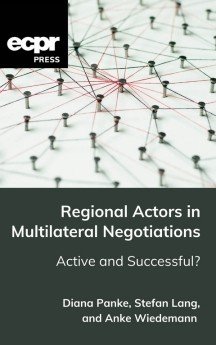Regional Actors in Multilateral Negotiations: Active and Successful?
About this ebook
Based on a quantitative analysis of more than 500 international negotiations and three in-depth case studies, the book not only explains why some regional actors are more vocal than others in international organisations, but also why they differ concerning their prospects for success.
About the author
Diana Panke is Professor of Governance in Multi-level Systems at Albert-Ludwigs-University Freiburg. She was previously Associate Professor at University College Dublin and research associate at Freie Universität Berlin. Her research interests include international and regional organisations, multilateral negotiations, institutional design, international norms, legalisation and compliance, and small states, as well as EU Politics and European Integration. Diana Panke has published in peer-reviewed journals, including the Journal of European Public Policy, the Journal of Common Market Studies, the Review of International Studies, Comparative Political Studies, West European Politics, the European Journal of International Relations, the Journal of European Integration, International Politics and European Political Science. She also wrote monographs The Effectiveness of the European Court of Justice: Why Reluctant States Comply (Manchester University Press, 2010), Small States in the European Union: Coping with Structural Disadvantages (Ashgate, 2010) and Unequal Actors in Equalising Institutions: Negotiations in the United Nations General Assembly (Palgrave, 2013).
Stefan Lang is a PhD candidate at the University of Freiburg. His research interests include international negotiations, regionalism as well as domestic conflicts and interventions. He specialized in quantitative methods. Since November 2013 Lang works a research associate in the project ‘Nested Games. Regional Organizations in International Organizations’. His publications have appeared in the British Journal of Politics and International Relations, Journal of International Relations and Development and Global Affairs.
Anke Wiedemann is a PhD candidate at the University of Freiburg. Her research interests include comparative regionalism, interregionalism and international negotiations. She specialized in qualitative methods. Wiedemann works as a research associate in the project ‘Nested Games. Regional Organizations in International Organizations’ since October 2013. Her publications have appeared in the British Journal of Politics and International Relations, Journal of International Relations and Development and Global Affairs.






